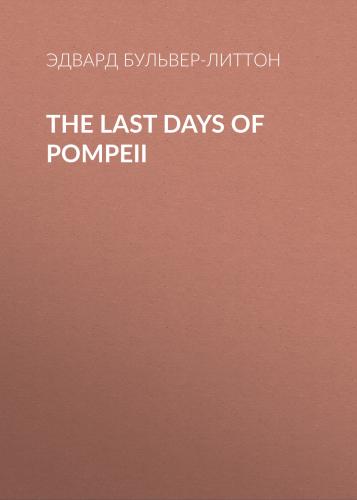By the cool banks where soft Cephisus flows,
A voice sail'd trembling down the waves of air;
The leaves blushed brighter in the Teian's rose,
The doves couch'd breathless in their summer lair;
While from their hands the purple flowerets fell,
The laughing Hours stood listening in the sky;—
From Pan's green cave to AEgle's haunted cell,
Heaved the charm'd earth in one delicious sigh.
Love, sons of earth! I am the Power of Love!
Eldest of all the gods, with Chaos born;
My smile sheds light along the courts above,
My kisses wake the eyelids of the Morn.
Mine are the stars—there, ever as ye gaze,
Ye meet the deep spell of my haunting eyes;
Mine is the moon—and, mournful if her rays,
'Tis that she lingers where her Carian lies.
The flowers are mine—the blushes of the rose,
The violet—charming Zephyr to the shade;
Mine the quick light that in the Maybeam glows,
And mine the day-dream in the lonely glade.
Love, sons of earth—for love is earth's soft lore,
Look where ye will—earth overflows with ME;
Learn from the waves that ever kiss the shore,
And the winds nestling on the heaving sea.
'All teaches love!'—The sweet voice, like a dream,
Melted in light; yet still the airs above,
The waving sedges, and the whispering stream,
And the green forest rustling, murmur'd 'LOVE!'
As the voices died away, the Egyptian seized the hand of Apaecides, and led him, wandering, intoxicated, yet half-reluctant, across the chamber towards the curtain at the far end; and now, from behind that curtain, there seemed to burst a thousand sparkling stars; the veil itself, hitherto dark, was now lighted by these fires behind into the tenderest blue of heaven. It represented heaven itself—such a heaven, as in the nights of June might have shone down over the streams of Castaly. Here and there were painted rosy and aerial clouds, from which smiled, by the limner's art, faces of divinest beauty, and on which reposed the shapes of which Phidias and Apelles dreamed. And the stars which studded the transparent azure rolled rapidly as they shone, while the music, that again woke with a livelier and lighter sound, seemed to imitate the melody of the joyous spheres.
'Oh! what miracle is this, Arbaces,' said Apaecides in faltering accents. 'After having denied the gods, art thou about to reveal to me…'
'Their pleasures!' interrupted Arbaces, in a tone so different from its usual cold and tranquil harmony that Apaecides started, and thought the Egyptian himself transformed; and now, as they neared the curtain, a wild—a loud—an exulting melody burst from behind its concealment. With that sound the veil was rent in twain—it parted—it seemed to vanish into air: and a scene, which no Sybarite ever more than rivalled, broke upon the dazzled gaze of the youthful priest. A vast banquet-room stretched beyond, blazing with countless lights, which filled the warm air with the scents of frankincense, of jasmine, of violets, of myrrh; all that the most odorous flowers, all that the most costly spices could distil, seemed gathered into one ineffable and ambrosial essence: from the light columns that sprang upwards to the airy roof, hung draperies of white, studded with golden stars. At the extremities of the room two fountains cast up a spray, which, catching the rays of the roseate light, glittered like countless diamonds. In the centre of the room as they entered there rose slowly from the floor, to the sound of unseen minstrelsy, a table spread with all the viands which sense ever devoted to fancy, and vases of that lost Myrrhine fabric, so glowing in its colors, so transparent in its material, were crowned with the exotics of the East. The couches, to which this table was the centre, were covered with tapestries of azure and gold; and from invisible tubes the vaulted roof descended showers of fragrant waters, that cooled the delicious air, and contended with the lamps, as if the spirits of wave and fire disputed which element could furnish forth the most delicious odorous. And now, from behind the snowy draperies, trooped such forms as Adonis beheld when he lay on the lap of Venus. They came, some with garlands, others with lyres; they surrounded the youth, they led his steps to the banquet. They flung the chaplets round him in rosy chains. The earth—the thought of earth, vanished from his soul. He imagined himself in a dream, and suppressed his breath lest he should wake too soon; the senses, to which he had never yielded as yet, beat in his burning pulse, and confused his dizzy and reeling sight. And while thus amazed and lost, once again, but in brisk and Bacchic measures, rose the magic strain:
In the veins of the calix foams and glows
The blood of the mantling vine,
But oh! in the bowl of Youth there glows
A Lesbian, more divine!
Bright, bright,
As the liquid light,
Its waves through thine eyelids shine!
Fill up, fill up, to the sparkling brim,
The juice of the young Lyaeus;
The grape is the key that we owe to him
From the gaol of the world to free us.
Drink, drink!
What need to shrink,
When the lambs alone can see us?
Drink, drink, as I quaff from thine eyes
The wine of a softer tree;
Give the smiles to the god of the grape—thy sighs,
Beloved one, give to me.
Turn, turn,
My glances burn,
And thirst for a look from thee!
As the song ended, a group of three maidens, entwined with a chain of starred flowers, and who, while they imitated, might have shamed the Graces, advanced towards him in the gliding measures of the Ionian dance: such as the Nereids wreathed in moonlight on the yellow sands of the AEgean wave—such as Cytherea taught her handmaids in the marriage-feast of Psyche and her son.
Now
